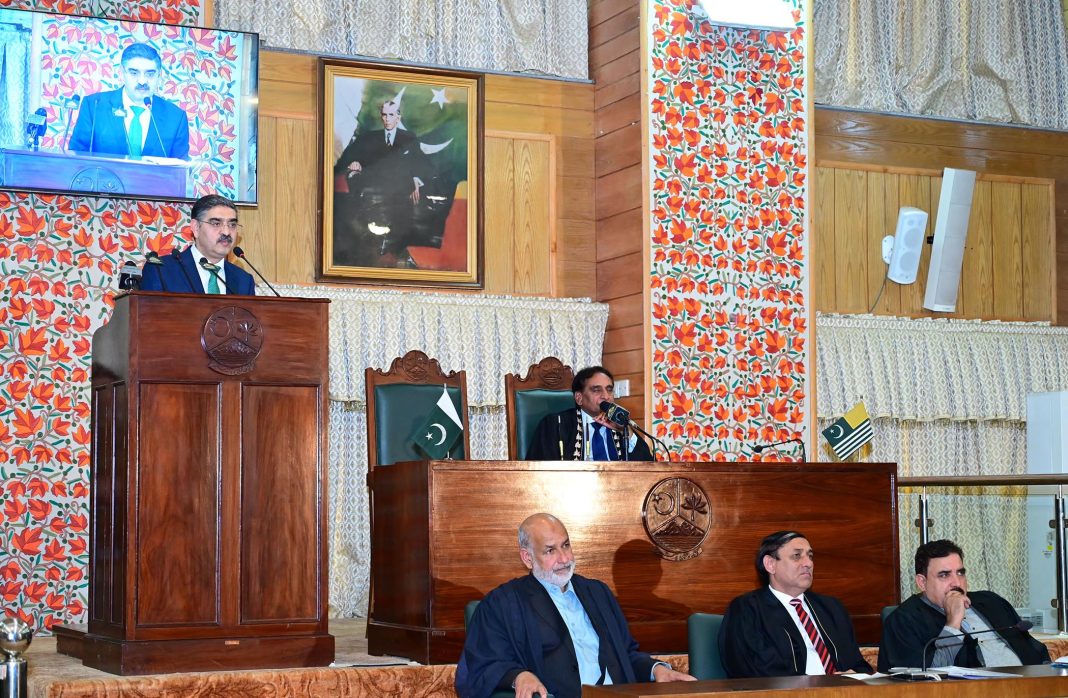
—— Censures India, says Pakistan can’t be indifferent to situation in Kashmir
—— Reaffirms Pakistan’s solid support to Kashmiris
—— Rejects Indian SC verdict on IIOJK, calls it politically motivated
—— Urges India to cease occupation efforts
DM Monitoring
MUZAFFARABAD: Caretaker Prime Minister Anwaarul Haq Kakar on Thursday reaffirmed Pakistan’s moral, political and diplomatic support to the people of Kashmir, and rejected the recent verdict of the Indian Supreme Court calling it a politically motivated and a tool to consolidate Indian illegal occupation.
Prime Minister Kakar, in his address at the special session of the Azad Jammu and Kashmir Legislative Assembly (AJK LA), urged India to cease efforts to solidify its occupation, revoke the illegal unilateral actions of August 5, 2019, and refrain from altering the demography of the disputed territory.
The session, chaired by AJK LA Speaker Chaudhry Latif Akbar, was attended by AJK Prime Minister Chaudhry Anwarul Haq and Assembly members.
PM Kakar also stressed upon India to halt the human rights abuses in the Indian Illegally Occupied Jammu & Kashmir (IIOJK), repeal emergency laws, withdraw heavy military presence and provide unhindered access to the United Nations bodies and the international media.
Kakar, the first-ever caretaker PM to address the AJK Legislative Assembly, paid tribute to the martyrs of the Kashmir movement and those affected by Indian ceasefire violations along the Line of Control. He reiterated Pakistan’s commitment to stand alongside the people of Kashmir in their struggle for their due rights.
“Kashmir is Pakistan’s jugular vein. The word ‘Pakistan’ is incomplete without Kashmir. The people of Pakistan and Kashmir are bound by unique affinity. We share joys and sorrow. Pakistan cannot remain indifferent to the situation in Kashmir… Kashmir runs in our blood. Jammu and Kashmir remains an important facet of Pakistan’s foreign policy,” he remarked.
Kakar stressed that the entire Pakistani leadership, across the political spectrum, stands united in supporting the Kashmiris’ right to self-determination. Providing a historical context, the prime minister highlighted the longstanding suffering of the Kashmiris, and that even today, the situation had not improved as the majority was still under the subjugation of an oppressor with a different name.
Prime Minister Kakar told the House that Kashmir was the oldest unsettled agenda of the United Nations as the UN Security Council resolutions remained unimplemented and the Indian government was bent upon consolidating its occupation of disputed territory through a series of legislative and administrative measures.
Referring to the Indian decision to take the Kashmir issue to the United Nations and the repeated acknowledgment of it as a dispute by Indian leaders, he stated that the current Indian government must honour its longstanding commitment to the UN resolutions.
He remarked that the Indian Supreme Court’s verdict was politically motivated rather than grounded in law to justify the illegal unilateral measures of August 5, 2019.
The prime minister noted that, considering its significant human rights abuses, the title of ‘world’s largest democracy’ for India should be amended to ‘world’s largest hypocrisy,’ where hollow slogans of democracy and diversity are used to conceal the marginalisation of minorities, state-sponsored terrorism, and illegal occupation.
He contended that the Indian actions in IIOJK constituted a breach of the UN Charter, UNSC resolutions, and international laws. The main objective of these measures, he asserted, was to disempower the Kashmiris in their own land. However, he emphasised that domestic legislation and judicial verdicts could not absolve India of its obligations.
He highlighted the contradiction between India’s aspirations to become a permanent member of the UN Security Council and its leadership’s disregard for international laws. Such contradictions, fuelled by the Hindutva ideology, should serve as a wake-up call for the international community, he added.
The prime minister pointed out the human rights abuses in IIOJK, including killings, forced disappearances, pellet gun injuries, and molestation of women, are documented in two UN reports.
He challenged the conscience of the international community, stating that despite these atrocities India could not undermine the resolve for freedom, even in the face of killings, illegal detentions, and the destruction of structures.
He mentioned India’s fear of Kashmiri leader Syed Ali Geelani even after his death and its pursuit of the death penalty for another leader, Yaseen Malik, as a manifestation of India’s failure to suppress the spirit of freedom.
The prime minister stated that Pakistan and the Kashmiris rejected Indian measures such as gerrymandering of constituencies and demographic changes.
He noted that the Kashmiris had long been deprived of normalcy in their land, hindering development due to the fearful environment.
While expressing Pakistan’s desire for good neighbourly ties with India, he held India responsible for vitiating the environment through its unilateral actions on August 5, 2019, leaving the onus on India to rectify the situation.
He clarified that Pakistan sought peace with justice, not peace with injustice.
Regarding belligerent statements by Indian leaders concerning Azad Jammu and Kashmir (AJK), the prime minister reiterated that Pakistan had exercised maximum restraint. He affirmed that Pakistan would never surrender to any form of threat or intimidation, standing firm to safeguard its sovereignty and interests.
He clarified that Pakistan had no issue with Hindu beliefs but opposed Hindutva, highlighting that a significant portion of minorities in Pakistan enjoyed their due rights and freedom.





